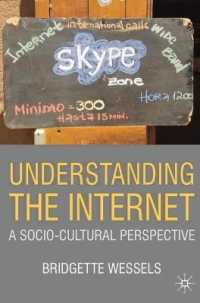Full Description
Social networks are ubiquitous. The science of networks has shaped how researchers and society understand the spread of disease, the precursors of loneliness, the rise of protest movements, the causes of social inequality, the influence of social media, and much more. Egocentric analysis conceives of each individual, or ego, as embedded in a personal network of alters, a community partially of their creation and nearly unique to them, whose composition and structure have consequences. This volume is dedicated to understanding the history, present, and future of egocentric social network analysis. The text brings together the most important, classic articles foundational to the field with new perspectives to form a comprehensive volume ideal for courses in network analysis. The collection examines where the field of egocentric research has been, what it has uncovered, and where it is headed.
Contents
Part I. Background; Introduction; Part II. Early Foundations; 1. From Simmel, 'On the Significance of Numbers for Social Life: Introduction,' 'The Isolated Individual and the Dyad,' 'The Triad,' and The Web of Group Affiliations: Commentary, 'Georg Simmel's Contribution to Social Network Research'; 2. From Katz and Lazarsfeld, Personal Influence: Commentary, 'Influencers, Backfire Effects and the Power of the Periphery'; 3. From Mitchell, 'The Concept and Use of Social Networks': Commentary, 'On J. Clyde Mitchell's 'The Concept and Use of Social Networks''; 4. From Bott, 'Urban Families: Conjugal Roles and Social Networks': Commentary, 'Commentary on Bott's 'Family and Social Network''; 5. From Festinger, Schachter, and Back, Social Pressures in Informal Groups: Commentary, 'Festinger, Schachter, and Back's Social Pressures in Informal Groups'; 6. From Bernard et al., 'The Problem of Informant Accuracy': Commentary, 'Implications of Informant Accuracy Research for Ego Networks'; 7. From White, Identity and Control: Commentary, 'On Parachutes and Lion-Taming'; Part III. Later Foundations; 8. From Fischer, To Dwell among Friends: Commentary, 'From the Northern California Community Study, 1977-78, to UCNets, 2015-20'; 9. From Granovetter, 'The Strength of Weak Ties': Commentary, 'Strength of Weak Ties in the Labor Market: An Assessment of the State of Research'; 10. From Wellman and Wortley, 'Different Strokes from Different Folks': Commentary, 'A Network Pilgrim's Progress: Twenty-Six Realizations in Fifty-Five Years'; 11. From Coleman, 'Social Capital in the Creation of Human Capital': Commentary, 'Three Decades of Research into Social Capital: Achievements, Blind Spots, and Future Directions'; 12. From Pescosolido, 'Beyond Rational Choice': Commentary, 'Confronting How People Cope with Crisis: From the Social Organization Strategy Framework to the Network Episode Model to the Network Embedded Symbiome'; 13. From Feld, 'The Focused Organization of Social Ties': Commentary, 'Reflections On 'The Focused Organization of Social Ties' and Its Implications for Bonding and Bridging' 14. From Burt, Structural Holes: Commentary, 'Structural Holes Capstone, Cautions, and Enthusiasms'; 15. From Laumann, Marsden, and Prensky, 'The Boundary Specification Problem in Network Analysis': Commentary, 'On the Boundary Specification Problem in Network Analysis: An Update and Extension to Personal Social Networks'; 16. From McPherson, Smith-Lovin, and Cook, 'Birds of a Feather': Commentary, 'The Enormous Flock of Homophily Researchers: Assessing and Promoting a Research Agenda'; 17. From Huckfeldt and Sprague, 'Networks in Context': Commentary, 'Individuals, Groups, and Networks: Implications for the Study and Practice of Democratic Politics'; 18. From Nan Lin, 'Building a Network Theory of Social Capital' Commentary, 'Social Capital: An Update'; 19. On the General Social Survey: 'Egocentric Network Studies within the General Social Survey: Measurement Methods, Substantive Findings, and Methodological Research'; Part IV. New Perspectives; 20. On Cognition: 'Network Representation Capacity: How Social Relationships are Represented in Human Mind'; 21. On Mobilization: 'How Actors Mobilize their Networks in Practice'; 22. On Trust: 'Self-Verification, Trust, and Social Capital Mobilization'; 23. On Dynamics: 'Personal Network Dynamics: Organizing Principles of Stability and Change from Complex Systems Theory'; 24. On Inequality: 'The Context of Network Inequality'; 25. On Culture: 'The Problem of Culture Flows in Weak Ties'; 26. On Migration: 'Personal Networks and Migration Trajectories'; 27. On Movements: 'The Opportunities and Challenges of Studying Social Movement Ego-Networks: Online and Offline'; 28. On Social Media: 'Studying Social Media from an Ego-Centric Perspective'.







